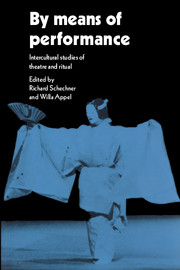Book contents
- Frontmatter
- Contents
- List of figures
- Notes on contributors
- Concerning Victor Turner
- Introduction
- 1 Are there universals of performance in myth, ritual, and drama?
- 2 Magnitudes of performance
- 3 Liminality: a synthesis of subjective and objective experience
- 4 The Yaqui deer dance at Pascua Pueblo, Arizona
- 5 A Yaqui point of view: on Yaqui ceremonies and anthropologists
- 6 Performance of precepts/precepts of performance: Hasidic celebrations of Purim in Brooklyn
- 7 The significance of performance for its audience: an analysis of three Sri Lankan rituals
- 8 What does it mean to “become the character”: power, presence, and transcendence in Asian in-body disciplines of practice
- 9 Korean shamans: role playing through trance possession
- 10 The practice of noh theatre
- 11 The profanation of the sacred in circus clown performances
- 12 Ethnographic notes on sacred and profane performance
- 13 The spatial sense of the sacred in Spanish America and the American South and its tie with performance
- 14 Space and context
- 15 The transformation of consciousness in ritual performances: some thoughts and questions
- 16 Universals of performance; or amortizing play
- Appendix
- Bibliography
- Index
3 - Liminality: a synthesis of subjective and objective experience
Published online by Cambridge University Press: 05 June 2012
- Frontmatter
- Contents
- List of figures
- Notes on contributors
- Concerning Victor Turner
- Introduction
- 1 Are there universals of performance in myth, ritual, and drama?
- 2 Magnitudes of performance
- 3 Liminality: a synthesis of subjective and objective experience
- 4 The Yaqui deer dance at Pascua Pueblo, Arizona
- 5 A Yaqui point of view: on Yaqui ceremonies and anthropologists
- 6 Performance of precepts/precepts of performance: Hasidic celebrations of Purim in Brooklyn
- 7 The significance of performance for its audience: an analysis of three Sri Lankan rituals
- 8 What does it mean to “become the character”: power, presence, and transcendence in Asian in-body disciplines of practice
- 9 Korean shamans: role playing through trance possession
- 10 The practice of noh theatre
- 11 The profanation of the sacred in circus clown performances
- 12 Ethnographic notes on sacred and profane performance
- 13 The spatial sense of the sacred in Spanish America and the American South and its tie with performance
- 14 Space and context
- 15 The transformation of consciousness in ritual performances: some thoughts and questions
- 16 Universals of performance; or amortizing play
- Appendix
- Bibliography
- Index
Summary
Subjectivity and objectivity in ‘participation’
In his book From Ritual to Theatre: The Human Seriousness of Play (1982) Victor Turner said that he was “frankly in the exploratory phase just now,” and it is a great loss to anthropology that he did not have time to continue that exploration. I cannot pretend that the direction I propose to take is one that he would have taken, but it is something that we discussed the last time we met and we shared at least the mutual conviction that the liminal state or condition is of major importance for our understanding of human society, just as we shared the closely related conviction that anthropology and theatre have much to offer each other.
In that same book Turner is often openly subjective. He writes as much as an artist as from the more conventional viewpoint of the anthropologist. He writes with feeling and of feeling; he is plainly aware of the importance of his own subjective experience in the field, but cannot quite break with his intellectual rational, objective tradition for long enough to explore this further. This has perhaps always been the major stumbling block for any of us who have concerned ourselves with liminal phenomena, for too often we have insisted that it is something that can and should be studied, just as we have made the absurd assumption that our much vaunted “participant observation” technique provides us with a corrective insight to counterbalance our otherwise totally external view of culture.
- Type
- Chapter
- Information
- By Means of PerformanceIntercultural Studies of Theatre and Ritual, pp. 50 - 81Publisher: Cambridge University PressPrint publication year: 1990
- 21
- Cited by



